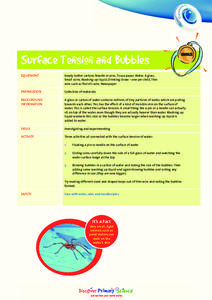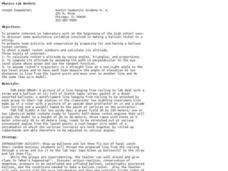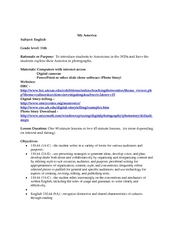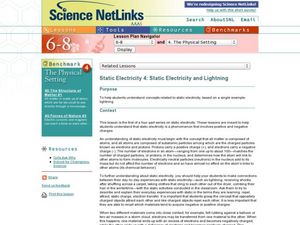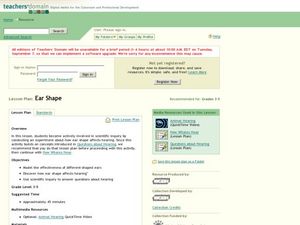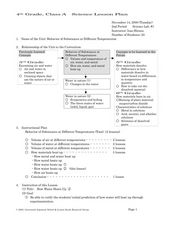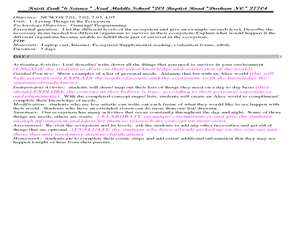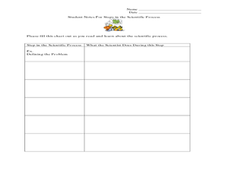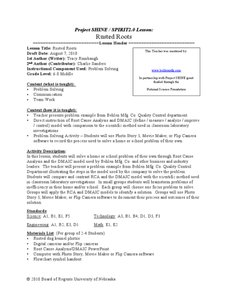Curated OER
Getting a Handle on Your Bee
Students observe dried bees, carefully glue them to toothpicks, and use them for cross pollinating their Brassica plants. They also describe reasons why two similar investigations can produce different results. Finally, students...
Curated OER
Habitats
Learners investigate the habitats of living things and the cycle of the food chain. In this scientific inquiry online instructional activity, students examine the habitats of plants and animals as well as the food chain as they sort...
Curated OER
Surface Tension and Bubbles
Students investigate surface tension and bubbles. In this scientific inquiry lesson plan, students explore how the surface tension of water is able to support tiny objects that actually weigh more than the water as they collect date by...
Curated OER
Density of Liquids
Students explore the density of liquids. In this scientific inquiry lesson plan, students discover the density of water, corn syrup, and cooking oil through an experiment. In addition, students will draw and label pictures of the...
Curated OER
Physics Lab Rockets
Students construct and test balloon rockets and a model rocket. In this rocket science lesson, students use an inquiry-based method to master balloon rockets and have a shoot-off with the goal of attaining the highest altitude. Next,...
Curated OER
My America
Eleventh graders compare 1920's America to modern America. In this historical perspectives lesson, 11th graders research both eras in American history using inquiry skills. As a culminating activity, students create digital slide shows...
Curated OER
Stream
Students examine stream waters. In this scientific inquiry lesson, students "explore" wetlands as they participate in a demonstration that reveals information about steam waters and insects.
Curated OER
Amazing Water Changes
Students explore the properties of water and how it changes states. In this kindergarten to 2nd grade science lesson, students pair a hands-on science activity with two suggested books. This inquiry lesson has extension activities to...
Alabama Learning Exchange
Air is All Around You
Pupils investigate the mysteries of air. In this science lesson, students participate in hands-on activities that require them to use the scientific inquiry model to study air.
Curated OER
Streamlines and Breadlines
Students explore the Great Depression. In this Great Depression instructional activity, students research selected websites and analyze primary sources to conduct inquiries regarding the depression, northern migration, and urbanization....
Curated OER
Twelfth Night Act 2 Scene 1
Students perform a close reading analysis of Shakespeare's Twelfth Night Act 2, Scene 1. Students examine the characters of Sebastian and Antonio and discuss themes, particularly those of the potential for tragedy within a comedy and...
Curated OER
Ear Shape
Students explore hearing. In this hearing and sound activity, students participate in a scientific inquiry to compare ear shape and hearing ability. Students work with a partner to listen to soft music and use various materials to...
Curated OER
How Water Heats Up
Fourth graders conduct experiments heating water. In this inquiry-based early chemistry lesson, 4th graders use the materials given to experiment with the process of heating water. Students draw conclusions based upon their findings...
Curated OER
Living Things in the Ecosystem
Sixth graders explore survival in ecosystems. In this ecosystem activity, 6th graders examine what the outcome would be if different organisms were unable to survive in their ecosystems. Students conduct inquiry research regarding the...
Curated OER
Preservation and the Power of Light
Students identify the effect of light on objects. In this scientific inquiry lesson plan, students use a chart to write a hypothesis about what will happen when colored construction paper is left in sunlight. Students observe and discuss...
Curated OER
Process Skills Review: Observation, Inference, and Predictions
A simple worksheet asks science learners to define five terms and identify five statements as predictions, observations, or inferences. This would be a supportive assignment when introducing elementary-levle scientist to inquiry practices.
Curated OER
Salty Sea Water
Young scholars conduct an experiment to find out if there is salt in the ocean. In this scientific inquiry lesson, students pour a cup of salt water onto an aluminum plate and observe the changes over a few days. Young scholars complete...
Curated OER
Student Notes for Steps in the Scientific Process
In this science inquiry skills worksheet, students fill out a blank chart as they read and learn about the scientific process. The chart has two columns with the titles, "Step in the Scientific Process" and "What the Scientist Does...
Curated OER
Cleaning Pennies
Students observe changes in a penny when it is cleaned. In this scientific inquiry lesson, students use a dixie cup filled with vinegar and salt, and drop the penny into the water. Students observe the changes.
Curated OER
Rusted Roots
Students create a flowchart on the root cause method. In this inquiry lesson, students compare RCA and the DMAIC model with the scientific method of problem solving. They investigate a problem in school and present their findings in class.
Curated OER
Polynomials and Factoring
Learners classify, add, subtract, and factor polynomials. In this polynomials instructional activity, students classify polynomials by creating their own system. During a discussion, the class decides on a common system. They add and...
Curated OER
Does salt have an effect on the temperature of ice?
Learners explore the effect that salt has on the temperature of ice. In this scientific inquiry instructional activity, students observe an experiment to see how cold ice can get when salt is added. Learners then explore how the ice...
Curated OER
By Golly By Gum
Students identify the different steps in the scientific method. In this inquiry instructional activity, students determine the mass of the gum after chewing it for sometime. They explain what happens to the lost mass.
Edgate
Why Map a Map?
After brainstorming reasons why Native Americans mapped their lands, your young critical thinkers will work together to review their ideas and determine the definition of a map. With today's extensive use of mapping technology and GPS...
Other popular searches
- Inquiry Based Learning
- Inquiry Based
- Scientific Inquiry
- Inquiry Based Cell Biology
- Life Science Inquiry
- Earth Science Inquiry
- Inquiry Based Physics
- Inquiry Lessons
- Science Inquiry
- Inquiry Based Science
- Environmental Inquiry
- Inquiry Based




